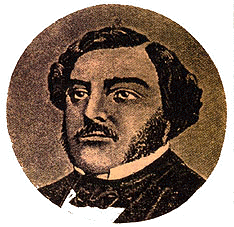Dimitar Miladinov (1810-1862)
About Dimitar Miladinov
Dimitar Miladinov was born in Struga, in 1810. As Dimitar Miladinov finished education, he had worked as a teacher in several cities in Macedonia.

"Dimitar Miladinov"
Dimitar Miladinov was sure that the Macedonian nation could liberate itself from the political and spiritual slavery only through the education and literacy. Dimitar Miladinov insisted on elimination of the Greek language in the schools, introduced the Macedonian language because of what, he came in conflict with the Greek bishop in Ohrid.
Dimitar Miladinov work
Central part in the Dimitar Miladinov's renaissance activity was the collection of the Macedonian folk art. As a result of his engagement, the Macedonian literature acquired the most representative work, "Zbornik na Narodni Umotvorenija - The Collection of Folk Songs, Riddles and Costumes", published in Zagreb in 1861.
The Collection consists of 662 folk songs. mostly about love. There are also many songs about the heroes and the haiduks: Marko Krale, Momchilo Vojvoda, Bolen Dojchin, Dete Dukadinche. Undoubtedly, one of the most important part of "The Collection" is the Macedonian-Croation dictionary that has cultural and historical value.
The creation of "The Collection" represents a large event in the cultural history of the Macedonian nation. Its contribution consists of the fact that the Macedonian nation became aware of the folk art as a national treasure and that the Macedonian language could be a noble resource for written expression and development of the Macedonian literature and culture.
"The Collection" showed to the world that the Macedonian language lived in the bosom of the Macedonian folk art as a mark of national originality. A lot of other poets learned from Dimitar Miladinov how to create their own art.
Dimitar Miladinov died in Istanbul in 1862, in prison.